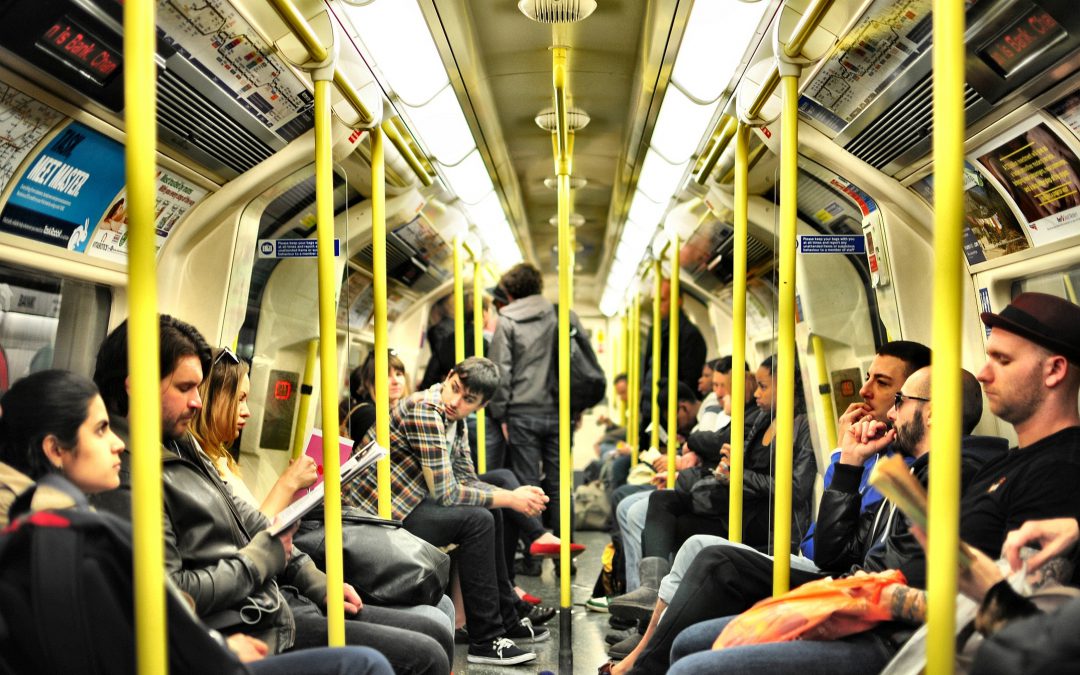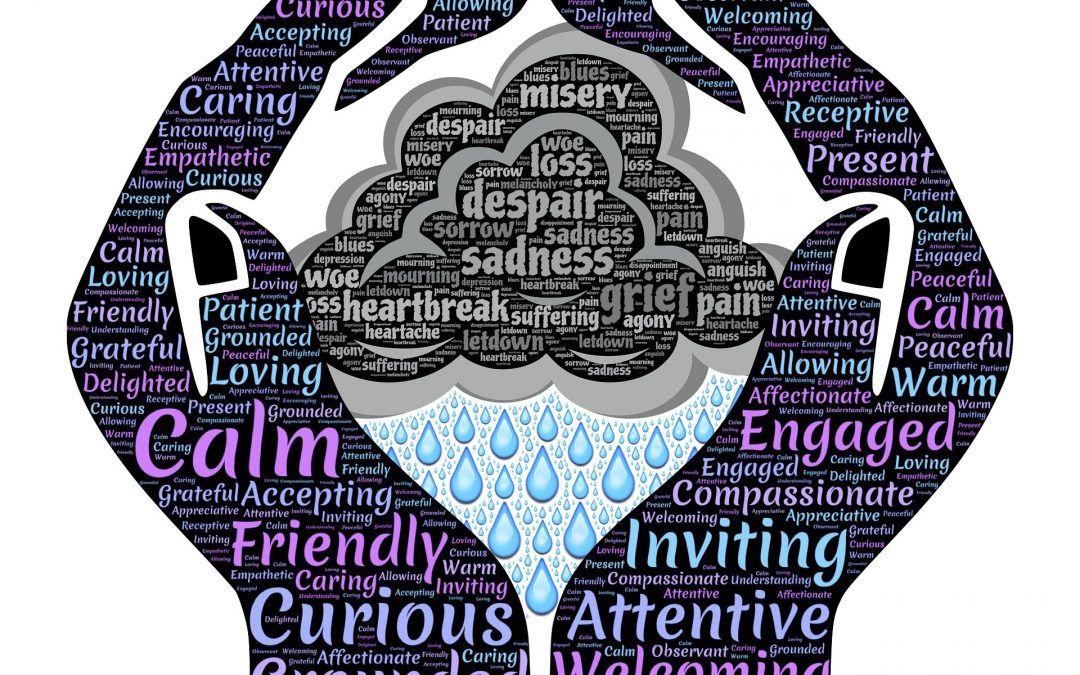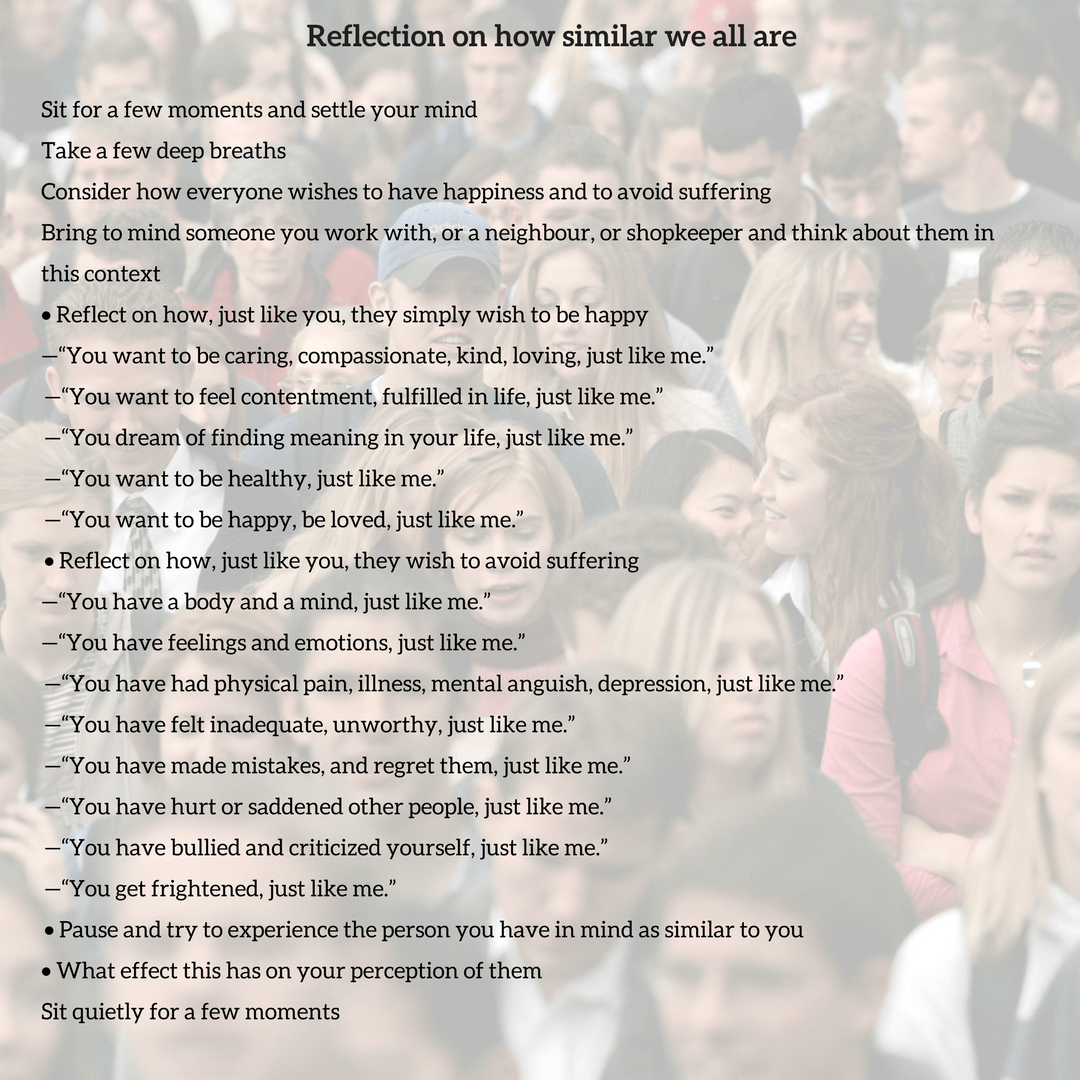
by Maureen Cooper | Mar 20, 2019 | City Living, Compassion, Mindfulness, Relationships, Work
How do you use your commute time?
Do you cycle to work, or drive in your car? Maybe you take a tram, or bus? Perhaps you use the metro or ride a train. Whichever way you make the journey, your commute is a solid chunk of time twice a day, every working day. You’re not at home but you’re not in work either. The time is your own but not really. You’re free to be as you wish but within strict parameters. On the way in to work, the tasks of the day are already pressing for your attention. On the way home, anticipating a pleasant evening competes with processing what has gone on during the day.
Maybe we choose to use the time travelling to fend off the thought of the working day ahead by catching up on some good reading. Perhaps we shut ourselves off from the crowd by turning up the volume on our headphones. I hear of an increasing number of people who watch Netflix during their journeys. Alternatively, we could use this time to steal a march on our working day by scanning through our emails on our phone, or tablet and running through the schedule for the day.
Taking a fresh look at your commute
Here’s another idea—to take charge of this time by yourself and use it for your wellbeing.
In research carried out in 2010 at Harvard University it was found that people spend almost 50% of their time thinking about something different to what they are doing and that it undermines their happiness. One of the most common times when people were ruminating in this way was on their commute.
So how do we take a fresh look at our commute?
A lot of the people that I work with, who are interested in making meditation part of their lives, find it difficult to make the time they need for meditation. Quite a few are experimenting with using their commute as a time to do a meditation session. Some use a meditation app and listen to a guided meditation. Others simply wait to find a seat, and then sit quietly and focus on their breath.
Here is a very simple way to do this.
Try being mindful and come home to yourself
- Take a few moments to check in with your breathing—pay attention to the sensation of your breath entering and leaving your body
- Notice how your body is feeling—do you have any places that feel tired, or weary, or are you feeling fresh and up for anything?
- Check in on your mood—are you feeling good about the day ahead, or is there something worrying you?
- Try to become aware of the thoughts passing through your mind—notice how quickly they change and turn into other thoughts
- Just register all this—try not to get drawn into feelings of liking, or not liking any of it.
What does this accomplish?
When we connect with ourselves in this way we are tuning into the present moment and getting in touch with how things are for us. We try to do this without judgement, without wanting to change anything—just with the aim of coming home to ourselves and settling our minds.
This will help us to move into our work situation in a more relaxed and stable mood ready for whatever comes our way. On the way home, it helps us to shake off the concerns of the day and get ready to spend an evening with our friends and family.
Consider other people as just like you
So much of the stresses and strains of the day come about during our interactions with other people. Often, we focus on the things that separate us from others, when in fact, there is a great deal that we all have in common.
If you still have time on your journey, try to turn your attention to your fellow passengers.
- Notice who your neighbours are—take a few moments to scan the compartment, tram or bus and to see as many of the other passengers as you can.
- Take note of the thoughts and emotions that pass through your mind as you do this:
—notice if you make a comment in your mind about someone
—notice the people you feel drawn towards and the ones you do not like the look of
- Try to imagine how they might see you as you sit, or stand alongside them
- Take a moment to be aware that everyone travelling with you wants their day to go well and to avoid any unpleasantness
—just as you do
- Then realize that inevitably for some people things will go wrong during the day
—let that feeling touch you and help you to feel a common humanity with your fellow travellers.
What does this accomplish?
Reflecting in this way reminds us that everyone wishes for a happy life and wants to avoid pain and suffering but that pain and suffering are an inevitable part of life. Coping with all this gives a common thread to all our experiences. It enables us to see that however different our interests are, we are all in the same boat. This can help us to develop a feeling of equanimity towards others as we engage in our working day.
It’s up to us
Of course, sometimes we just want to read, or listen to music and that’s completely fine but we do have the option to take a fresh look at our commute. We can prioritise self-care and use this limbo-time in our day to develop our mindfulness—both of ourselves and of others. Spending a bit of time each day in this way will help us to deal with our work from a less stressful perspective. It will also help us to actually relax and enjoy our time when is over for the day.
Do drop a comment in the comment section and let me know if you have tried meditating during your commute and how you got on with it.
If you found this post useful you might like to check out our free 5-day e-course
HOW TO MAKE YOUR COMMUTE BENEFIT YOUR WORKING DAY

by Maureen Cooper | Jan 13, 2019 | Relationships, Yourself
When things are really tough for you, do you find yourself thinking of friends and family and kind of grading the emotional support they offer? Do you ever have these kind of thoughts?
Well so and so has not called to see how things are going
It was nice of them to check in but that was last week
They promised to help but then weren’t there when I needed them
They only called to tell me about their problems
It can be hard to admit, even to ourselves, that we judge the emotional support people offer us in this way. No-one wants to feel needy, or ungrateful but when we are feeling really bad it’s all too easy to lose perspective.
Of course, when we are going through hard times we look for emotional support from people we love and trust. We know that being able to express our worries in a supported environment will help us to cope better. The problem comes when we hope for too much. Then we have to deal with the struggle we are going through, as well as our disappointment about the support we receive.
Here’s a few things we can try when we feel ourselves prescribing the emotional support we want from other people.
Don’t expect other people to offer emotional support like you would
Some people are natural carers, with an empathic understanding of what someone might need when they are struggling. This is not true of everyone. Most of us have some friends who are lovely people but pretty tone-deafin terms of reading the emotional needs of others.
If you are a good listener and prepared to go out of your way for a friend in need, maybe it’s going to be a challenge when you are the one wanting emotional support. It’s important to remember that a small gesture from another person might be a big offering for them. Just because you might do more, does not mean that they are not trying to be there for you.
Hoping for things from people blocks the emotional support they are actually offering
One of my closest friends has a demanding job and a complicated personal life. One of her ways of coping is to focus on what goes well for her and taking time out from what stresses her. I know she really cares for me, but I get frustrated when my concerns are part of what she wants to avoid. There is a part of her that just cannot stand it when things are tough for me and so for long periods she does not engage.
I can wish she would SKYPE with me and have a good talk, but I know she won’t. If I get stuck there then I miss the small, frequent, small signs from her that she is thinking of me and wishing me well—the text messages, the FB posts, the cards in the mail.
She has her own way of holding me when I am going through something. If I can relax and accept it for what it is, I can feel her emotional support and benefit from it. If I long for what I think she should be offering it’s a different story.
It’s quite an art to be able to accept the help that people offer on their terms, rather than restyling it into something that you think they should be offering.
We are all caught in our own stories
Although each of us is hard wired for kindness and we value and need social connection, we are also focused on getting what we think we need in order to live the life we want.
We have inherited the oldest part of our brain from our reptilian ancestors.This part of our brain is concerned solely with survival—our fight, flight, or freeze responses; our wish to procreate, and how we deal with danger and fear. Any response we make from this part of our brain is instinctive and automatic. The neocortex is the newest part of our brain and is concerned with reason, imagination, and problem-solving. It’s the seat of social skills and compassionate responses. However, it can be hijackedby the old brain and our instincts can take over from our reason.
However, much we want to act with kindness and consideration, we are subject to the overwhelming power of our basic instinct to preserve ourselves. Although our kindness is hard-wired we need to pay attention to it in order to bring it into action—it needs intention and focus. Our self-interest is instinctive.
So, when we look for emotional support from those close to us, we need to remember that, just like us, they are juggling their genuine wish to help and be of benefit with their deep-seated urge to make sure everything is right for them.
The most reliable emotional support comes from our own ability to care for ourselves.
In my experience the best way to care for myself is to maintain a regular practice of meditation. It’s not just my everyday meditation session but bringing the attitude of meditation into my everyday life.
Here are some of the things I notice that meditation helps me with:
- I find I am less judgemental of myself of and other people, which is incredibly relaxing. It is less difficult to avoid beating myself up when I feel down.
- I am able to trust myself and my own insight more deeply and to see what I need to do in order to work with the challenges I am facing.
- I am less impatient about getting what I think I need right then and there
- Even when I am going through something challenging, I feel a greater sense of patience and acceptance that this is just what is happening now.
- It’s more possible to let go of things I think I need from other people
- I have a greater capacity to be grateful for what comes my way and to appreciate the emotional support people offer me when I need it.
Meditation helps me to become more self-reliant but at the same time to see more clearly how much people really do want to offer emotional support and how that is not always easy to do.
If you are interested to learn more about meditation you might find this online course helpful

How to Make Time for Meditation in a Busy Life
You can find out more here

by Maureen Cooper | Aug 9, 2018 | Self-compassion, Yourself
A few weeks ago, I was visiting some friends of mine and there was a bit of a crisis. Their 27-year-old son, who has temporarily moved back in with them, had decided to run a half-marathon in another city the day after a family event that had been scheduled for more than a year. He was still planning to attend the event but would need to leave early. Everyone knew that this was going to cause a major upset.
Later on, I talked with him about it. He explained that he had reached a time in his life when he had to begin to prioritise his own needs. He felt that for most of his life he had focused on wanting to please other people and now it was time see how he himself wanted to live. It was important to him to get back into running and this half-marathon was the best way to do that.
In many ways I felt a great deal of sympathy for him. Deciding to take one’s self-care seriously is an important milestone in one’s life. It marks another stage in growing up. However, there were aspects of his dogged determination to follow his own instincts and to turn aside from the feelings of those close to him that felt slightly evangelical to me. He was on a bit of a crusade of self-care and to stop and think of the impact of his actions on others was like going back on his new goal. It got me thinking about how subtle self-care can be and how easy it is to over-simplify it. I decided to explore it some more.
What is self-care?
In 2005 the UK Department of Health published a broad definition of self-care:
Self-care is a part of daily living. It is the care taken by individuals towards their own health and wellbeing, and includes the care extended to their children, family, friends and others in neighbourhoods and local communities.
This definition points out that self-care is a means of working with stressors in daily life, rather than a method of avoiding problems with momentary distractions and indulgences. It seems to imply that extending care to one’s children, family, friends and neighbours fits into the overall definition of self-care. This makes sense from a wholistic point of view as it is hard to see how you could be truly caring for yourself, if you neglect all the people connected to you in your life.
There is now an international self-care daywhich falls on 24 July and is run by the International Self-Care Foundation. They stipulate Seven Pillars of Self-Care.

What strikes me most about these Seven Pillars is that they focus on the physical aspects of self-care, with an enormous topic like mental wellbeing and self-awareness being crammed into just one pillar.
For self-care to be effective, we need to come at it in as broad a way as we can. Taking good care of our physical health is important but the way we manage stress, and work with the challenges of life are deeply intertwined with how our bodies cope. We can be exercising regularly and eating healthily but pushing ourselves too hard at work. We might give up smoking and cut down on our alcohol intake but be struggling with a relationship breakdown.
Elements of self-care
In her a recent article, health coach Tara Sareen divides self-care into two categories: recreational self-care and transformative self-care.
RECREATIONAL SELF-CARE
This is the kind of self-care that offers a break in what you are dealing with—a special night out, a weekend away, a good massage. It’s refreshing and gives us a boost. For the most part it is easy to set up, and it’s highly enjoyable.
TRANSFORMATIVE SELF-CARE
This kind of self-care might not necessarily be fun—it might even be quite demanding. It could involve finding time to learn something new, like meditation. We may decide to embark on a session of counselling. The important thing is that it takes our needs seriously and is a way of investing in sustainable wellbeing and personal growth. The effort is greater, but the rewards are more lasting.
If we want to go a little deeper, we can look to the four dimensions of human existence as laid out in Existential Wellbeing counselling. These are:
-
The physical dimension
This involves everything that has to do with the tangible, sensory body and the natural and material environment. Important values in this dimension are safety, comfort, pleasure, and health.
-
The social dimension
Here the focus is on your relationship with other people and everything that concerns your position in society. Important values are status, recognition and success but also includes caring for others, friendship and belonging.
-
The psychological or personal dimension
In this dimension, psychological characteristics are involved, personality traits, intellectual ability and opinions you hold about yourself. Here self-knowledge, autonomy and freedom are of great importance. Investing in this dimension can lead to a rich inner life. It involves a self-acceptance, coming to terms with yourself and processing and accepting your past and present life.
-
The spiritual dimension
This includes self-transcending ideals, a broader system of meaning, spiritual values, the confidence that there is a meaningful direction that develops in life. There is more emphasis on oneself as part of the whole. It is experienced less as a fourth dimension than as a deepening and foundation for the other three.
Personally, I find reflecting on these four dimensions to be very helpful in assessing where my ability to care for myself is quite robust and where it is weaker. The idea is that we find some sort of balance between these four dimensions and I can see clearly where some of my own imbalances lie. These dimensions take self-care to a different level and enable us to take a more integrated look at how and where we need to practice it.
Why is it an issue?
When you scan the internet, and various self-help publications and website it does not take long to see that self-care is a hot topic. It seems that we are not very good at it and many intelligent, resourceful and seemingly efficient adults are failing to give themselves the care that they need in order to avoid burn-out, compassion fatigue, and high stress. Let’s take a brief look at some of the reasons why that is.
-
We drive ourselves too hard
Many of us are juggling demanding jobs, tight budgets, the needs of our family and our own expectations of ourselves. Each day is a list of things to get done and we struggle to keep up. Perhaps we do aspire to take better care of ourselves but then we have a work deadline and need to stay late to accomplish it. There’s been no time to eat properly during the day and we have drunk too much coffee. We get home late and feel guilty that we have had so little time with the kids. Before we go to bed we need to take time to make sure everything is in place for the next day. We fall into bed late and wound up and can’t fall asleep.
-
Most of us have an active and harsh inner critic
Do you have a voice in your head that gives a running commentary on how you are going about things? Does it remind you of a teacher, or parent, or a former boss? Many of have such voice that speaks to us in a way we would never speak to another person and get we subject ourselves to its tyranny on a daily basis. We think the voice is helping to keep us in line, but it is stifling our creativity and sense of adventure.
-
Our pursuit of perfection is a no-win situation
In her book, The Gifts of Imperfection, Brené Brownsays,
Perfectionism is self-destructive simply because there is no such thing as perfect. Perfection is an unattainable goal.
Moreover, we tend to seek perfection so that people will approve of us and want to be with us. We use it a means of ensuring that we are loved and loveable, when we have no chance of attaining it and even less of maintaining it.
Befriending ourselves
Once we grow up and leave home, self-care becomes our own responsibility and not part of how we are parented. At the same time, it becomes subject to all the forces of our own worries and hang ups—sometimes making it very hard to care for ourselves as we need to. Yet we can see, that part of growing up and maturing—at whatever age—is to learn to be a good friend to ourselvesand to self-care as an essential part of the way we live. We owe to ourselves, to the people around us and the world at large.
A sure way to get self-care right – understand its scope
It can be hard work
It seems that in spite of all the hype, self-care is a basic human need for each one of us. Every time we get confused and go for the ‘treat’ response to our worries and stress, we are actually cheating ourselves of that self-care. Of course, it is fun to treat ourselves from time to time but when it becomes a coping strategy then we are in trouble. Sometimes caring for ourselves is hard work but that’s OK if it helps us transform and grow.
To care for ourselves we need to include other people
Likewise, if we think self-care is all about focusing on ourselves we are missing out on the vast dimension of our social world and inter-related acts of kindness. Self-focus as a means of caring for ourselves withdraws us from a powerful source of nurture, and healing which we can find in understanding the interconnected experience and understanding of human beings. Recognising that everyone struggles some of the time helps us to see our challenges in perspective.
We might need to try something new
It seems we need a certain courage, and a clear sense of balance to be able to coax ourselves into a pattern of productive self-care. It is good to see that so many of the experts recommend meditationas a basis for learning to befriend ourselves as we are and continue to strive for all facets of wellbeing. Meditation helps us to learn to be more present to our experience. We become less in thrall to mulling over things that have already happened or worrying about things that may never happen.
I hope that running his half-marathon brings my young friend the boost he needs but my biggest wish for him would be that he takes the time to reflect on all aspects of self-care. Perhaps his self-focus is a starting point and he’ll get into seeing the bigger picture as he goes along.

Hello there: If you enjoyed this post and want to go further you might like this online course How to Be a Good Friend to Yourself – you can sign up here

by Maureen Cooper | Jul 16, 2018 | City Living, Meditation, Self-compassion, Yourself
This is the story of how I recently overcame my feelings of wanting to lie low and nurse my stress by going into town and joining with the common humanity I found there.
The last few months have been pretty stressful one way and another and I have been feeling the effects. I work from home, which is great, but when things are intense I can end up feeling a bit isolated. A couple of weekends back my partner was away giving a workshop and I had not made any plans myself. Because I was not feeling sociable, I thought I could work through the weekend.
Unexpectedly, Saturday morning dawned fresh and bright and tempted me to go out and play.
Getting out of my comfort zone
Although I could feel the pull to get out of the house I resisted for a while—I had too much to do, I didn’t want to spend loads of money, I was a bit tired…………. After a while I realised, with a bit of a shock that what was getting in the way was my reluctance to leave my comfort zone. It was easier to stay at home, feeling a bit sorry for myself, than make the effort to go out. This insight gave me a real jolt. I don’t see myself as someone who plays safe. I made up my mind to get ready and go out.
Common humanity and self-compassion
Kristen Neffis one of the leading voices in the research and practice of self-compassion. She sees self-compassion as being composed of three elements:self-kindness, common humanity and mindfulness. Each of these components is an antidote to ways we can undermine ourselves when we do not practice self-compassion. So self-kindness is an antidote to judging ourselves and mindfulness is an antidote to over-identification, or the ways we exaggerate what is happening around us. Common humanity is the antidote to self-isolation. I certainly felt that when I realised part of me preferred to stay home and wallow!
The healing potential of connecting with common humanity was something I experienced directly that Saturday, as I went tired and bruised into town and came home feeling re-charged and uplifted.
Connecting with others is healing
Amsterdam was packed that day. I had forgotten for a moment the huge impact of tourists in the city. There are always lots of people visiting Amsterdam but, in the summer, it gets astronomical. In a city of less than one million inhabitants, 18,000,000 visitors are expected this year. Sometimes I can find this invasive but somehow this time it touched me.
So many people were out and about wanting to enjoy themselves and have a good time. You could hear a whole range of languages and accents as people tried to find their way around the city. There were families and young couples. Older people in tourist parties followed closely behind their guide. There was a tangible sense of movement and enquiry.
To my shame, my Dutch is very poor. Although I have lived in Amsterdam for many years I have not managed to become fluent in Dutch. When I am on my own I always want to let people know that I am not a tourist, just a poor Dutch speaker. On this Saturday I had interactions with all kinds of people in shops, and my confession led to a whole series of interesting stories with the people working in the shops I visited. There was lots of sharing of experiences and much laughter and teasing.
Because I was on my own, people were more likely to take time to talk with me. I could feel something in me relax with the enjoyment of chatting without any particular kind of agenda. In the café where I stopped for coffee there was time to look round and see the other people enjoying their coffee and cake.
One of my favourite meditations for common humanity
The more I walked around and felt myself as one of the crowd, the more I could feel the tightness of recent months begin to dissolve. With my own stress and worry still so close, it was a small step to look at others and wonder how they were and what they were coping with.

This is adapted from a practice in Search Inside Yourself: the unexpected path to achieving success and peace by Chade-Meng Tan.
I found myself reciting, or paraphrasing lines from this meditation more and more as the afternoon went by. Would anyone know from looking at me what I had been carrying over the last months? Probably not. How can any of us gauge what someone is dealing with, other than by accepting the basic truth that life is both wonderful and very hard at the same time. We all want things to go well but life shows us that some of the time they won’t. Everyone has their own worry, suffering and pain—everyone. So it is possible to look into the eyes of anyone you pass by and think, ‘just like me.’This is the experience of common humanity for me.
Remembering gratitude
As my walk around town continued I experienced a growing sense of gratitude. It felt so good to be part of the energy of the people enjoying the city, as well as feeling a sense of connection between myself and them.
My worries were still there but I felt much less alone with them. Remembering that everyone I was meeting would be going through their own version of challenge and anxiety lifted the heaviness from my own. Before I set off to play in town I was feeling that my problems were all-pervasive. After a few hours of shopping and people-watching I simply felt that we were all in the same boat—wanting happiness but dealing with whatever comes along.
Research into gratitude over the past 15 years is finding several emotional, and lately even physical benefits. Connecting with common humanity, recognising its power to help me and experiencing gratitude because of that transformed my mood and lifted my heart. I will not quickly forget the experience.

Hello there!
If you enjoyed this post and want to go further, you might enjoy this online course:
How to Be a Good Friend to Yourself
You can find out more here









